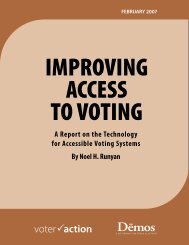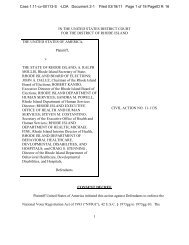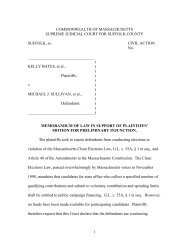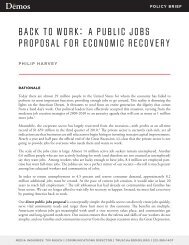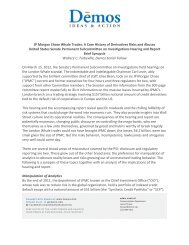how to raise the phone bill of the average new jersey family
how to raise the phone bill of the average new jersey family
how to raise the phone bill of the average new jersey family
- No tags were found...
You also want an ePaper? Increase the reach of your titles
YUMPU automatically turns print PDFs into web optimized ePapers that Google loves.
H O W T O R A I S E T H E P H O N E B I L L O FT H E AV E R A G E N E W J E R S E Y FA M I LYW h a t S 2 6 6 4 W i l l D o T o N J C o n s u m e r sNathan Newman, Ph.D., Richard Brodsky, Dēmos Senior FellowA Dēmos and New Jersey Policy Perspective ReportNathan Newman | Richard Brodsky 1
ABOUT DĒMOSDēmos is a non-partisan public policy research and advocacy organization. Headquartered in New York City,Dēmos works with advocates and policymakers around <strong>the</strong> country in pursuit <strong>of</strong> four overarching goals: a moreequitable economy; a vibrant and inclusive democracy; an empowered public sec<strong>to</strong>r that works for <strong>the</strong> commongood; and responsible U.S. engagement in an interdependent world.ABOUT NEW JERSEY POLICY PERSPECTIVENew Jersey Policy Perspective is a nonpr<strong>of</strong>it, nonpartisan organization established in 1997 <strong>to</strong> conduct researchand analysis on state issues. NJPP is amember <strong>of</strong> <strong>the</strong> Economic Analysis Research Network and <strong>the</strong> State FiscalAnalysis Initiative.ABOUT THE AUTHORSNathan Newman has been analyzing and writing about telecommunications policy for nearly twenty years.Newman received a Ph.D. from UC-Berkeley where his dissertation, <strong>the</strong>n book, Net Loss: Internet Prophets,Private Pr<strong>of</strong>its and <strong>the</strong> Costs <strong>to</strong> Community, detailed <strong>the</strong> relationship between telecommunications public policyand local economic development. Harvard Business Review described it as a “provocative case for business civicmindedness”in <strong>the</strong> context <strong>of</strong> <strong>the</strong> information economy. He also received his J.D. from Yale Law School and haswritten regularly on <strong>the</strong> legal aspects <strong>of</strong> technology policy. From 1991-1996, Newman was co-direc<strong>to</strong>r <strong>of</strong> UC-Berkeley’s Center for Community Economic Research, where he wrote regularly about policy around <strong>the</strong> emergingInternet economy. From 1997-1999, Newman was Program Direc<strong>to</strong>r at NetAction, a consumer watchdog group,where he was an early advocate for anti-trust scrutiny <strong>of</strong> Micros<strong>of</strong>t and o<strong>the</strong>r technology policy. Most recently,as Policy Direc<strong>to</strong>r and <strong>the</strong>n Executive Direc<strong>to</strong>r <strong>of</strong> Progressive States Network from 2005-2010, he oversaw <strong>the</strong>creation <strong>of</strong> a Broadband Buildout and Technology Investments program <strong>to</strong> promote state telecommunicationspolicies, including authoring a report on smart grids which was released on Capi<strong>to</strong>l Hill in March 2010 inconjunction with a Capi<strong>to</strong>l Hill press conference headlined by Congressman Rep. Ed Markey. His reports ontelecommunications and technology policy have been published by multiple organizations and cited nationally in<strong>the</strong> New York Times, Sacramen<strong>to</strong> Bee, San Jose Mercury News, Baltimore Sun, Wired, Village Voice, ZDNet,CNet News, San Francisco Chronicle, TheStreet.com, Chronicle <strong>of</strong> Higher Education, MIT’s TechnologyReview and <strong>the</strong> American Prospect.Richard Brodsky is a Senior Fellow at Demos and a former state assemblyman in New York State, where hewas Chairman <strong>of</strong> <strong>the</strong> Committee on Corporations, Authorities, and Commissions from 2002 until 2010. Fromthat position, among o<strong>the</strong>r accomplishments, he led significant investigations and authored <strong>the</strong> Cable TelevisionReform Act, and legislation <strong>to</strong> limit surcharges. For his work, Richard has received <strong>the</strong> Rockefeller College <strong>of</strong>Public Affairs Distinguished Public Service Award, <strong>the</strong> Martin Lu<strong>the</strong>r King, Jr. Award, <strong>the</strong> United Federation <strong>of</strong>Teachers Friend <strong>of</strong> Education Award, <strong>the</strong> International Association <strong>of</strong> Firefighters Achievement Award, <strong>the</strong> NewYork State Audubon Society William B. Hoyt Environmental Award, and <strong>the</strong> Adirondack Council Conservationis<strong>to</strong>f <strong>the</strong> Year Award along with many o<strong>the</strong>rs. Richard is a graduate <strong>of</strong> Brandeis University and Harvard Law School.How To Raise The Phone Bill Of The Average New Jersey Family: What S 2664 Will Do To NJ Consumers
TABLE OF CONTENTSExecutive Summary 1I. Introduction: S 2664 Will Raise <strong>the</strong> Tele<strong>phone</strong> Bill Of The Average New Jersey Family 3II. S2664 Destroys Consumer Protections That Have Worked For New Jersey FamiliesFor Decades 4Phone Regulation is Working for New Jersey Consumers 4S 2664 Will Raise Phone Rates and Hurt Quality for Consumers 4S 2664 is Far More Radical than Most O<strong>the</strong>r State Phone Deregulation Efforts 5III. Failure <strong>of</strong> Phone Deregulation Nationally 7Phone Rates Have Increased Significantly in Most States After Deregulation 7The California Results <strong>of</strong> Deregulation 7Higher Phone Rate Increases Would Follow <strong>the</strong> Pattern <strong>of</strong> Cable Deregulation 7Loss <strong>of</strong> Consumer Protections 7IV. The Danger <strong>of</strong> Asset Sales S<strong>how</strong>s <strong>the</strong> Need for Regula<strong>to</strong>ry Vigilance 9Verizon Has Left a Trail <strong>of</strong> Bankruptcies and Defrauded Shareholders in <strong>the</strong> Wake <strong>of</strong> itsAsset Sales 9Cus<strong>to</strong>mers Suffered Massive Quality <strong>of</strong> Service Problems 9How Strong Regula<strong>to</strong>ry Supervision <strong>of</strong> Landline Asset Sales Have Benefitted Consumers inO<strong>the</strong>r States 9S 2664 Will Harm New Jersey Consumers in <strong>the</strong> Event <strong>of</strong> a Verizon Asset Sale 10V. S 2664’s Rush <strong>to</strong> Deregulate is Based on Too Little Evidence and Ignores <strong>the</strong> Poor TrackRecord <strong>of</strong> Deregulation in O<strong>the</strong>r States and Industries 12Regulation is Needed for Effective Competition and Consumer Protection 12Landline Markets are Not Competitive 12Wireless and VOIP Services are Not a Competitive Substitute for Wireline Tele<strong>phone</strong> Services 13VI. Conclusion 15Appendix 16Endnotes 22Nathan Newman | Richard Brodsky
EXECUTIVE SUMMARYI. INTRODUCTION: HOW TO RAISE THE TELEPHONE BILL OF THE AVERAGE NEWJERSEY FAMILY – THE CONSEQUENCES OF S.2664»»S 2664 will likely lead <strong>to</strong> rate increase for New Jersey families similar <strong>to</strong> those experienced by o<strong>the</strong>r states in<strong>the</strong> wake <strong>of</strong> deregulation. A 50 percent hike similar <strong>to</strong> that experienced in California would mean a nearly$100 per year hike for each New Jersey basic <strong>phone</strong> service cus<strong>to</strong>mer. S 2664 could also cost those cus<strong>to</strong>mersand New Jersey taxpayers hundreds <strong>of</strong> millions <strong>of</strong> dollars, even <strong>bill</strong>ions <strong>of</strong> dollars, if Verizon sells <strong>of</strong>f itslandline business in <strong>the</strong> state without rigorous regula<strong>to</strong>ry oversight.II. WHY WOULD THE NEW JERSEY LEGISLATURE BREAK ONE OF THE BESTTELEPHONE SYSTEMS IN THE NATION AND RAISE PHONE RATES ON WORKINGFAMILIES?»»Phone Regulation is Working for New Jersey Consumers: New Jersey has kept lifeline and basic <strong>phone</strong>service rates lower than almost every o<strong>the</strong>r state. And low <strong>phone</strong> rates have not undermined expansion<strong>of</strong> higher-end services: New Jersey has <strong>the</strong> highest percentage <strong>of</strong> <strong>the</strong> population with access <strong>to</strong> broadbanddownload speeds greater than 3 Mbps and <strong>to</strong> three or more options for high-speed Internet access.»»S 2664 Will Raise Phone Rates and Hurt Quality for Consumers. S 2664 deregulates <strong>the</strong> whole landline<strong>phone</strong> system by defining competition <strong>to</strong> include wherever <strong>the</strong>re is a “commercial mobile service,” <strong>the</strong>rebyeliminating crucial consumer protections, including anti-discrimination protections, protecting against“slamming,” credits for outages, and adequate service guarantees for <strong>the</strong> whole state.»»S 2664 is Far More Radical than Most O<strong>the</strong>r State Phone Deregulation Efforts. In one survey, <strong>of</strong> 26states that had implemented some form <strong>of</strong> deregulation, 17 <strong>of</strong> <strong>the</strong> states limited price deregulation <strong>of</strong> basicservices only upon a company-specific basis, and only two jurisdictions had no limits on annual increases forbasic <strong>phone</strong> services. Eight o<strong>the</strong>r states have required economic development commitments in exchange forfuture deregulation. O<strong>the</strong>r states have maintained requirements that rate increases be “just and reasonable”amounts, expanded Lifeline <strong>phone</strong> access, limited rate increases per year, and/or required reviews <strong>of</strong> <strong>the</strong>effects <strong>of</strong> deregulation.III. LANDLINE LOCAL PHONE DEREGULATION HAS FAILED ACROSS THECOUNTRY —DELIVERING HIGHER COSTS TO CONSUMERS AND WORSE SERVICE.»»Phone Rates Have Increased Significantly in Most States After Deregulation. One national survey foundthat out <strong>of</strong> 20 states surveyed with deregulation in place, 17 <strong>of</strong> those states had seen rate increases rangingfrom 8 percent per year <strong>to</strong> 100 percent per year.»»The California Results <strong>of</strong> Deregulation: A review <strong>of</strong> four years <strong>of</strong> deregulation by <strong>the</strong> California StateSenate found large increases in rates and increases <strong>of</strong> several hundred percent for some services.»»Higher Phone Rate Increases Would Follow <strong>the</strong> Pattern <strong>of</strong> Cable Deregulation where lower prices didnot result from deregulation.»»Loss <strong>of</strong> Consumer Protections: One critical loss from <strong>phone</strong> deregulation in o<strong>the</strong>r states has been not justhigher rates but also <strong>the</strong> loss <strong>of</strong> an effective regula<strong>to</strong>r who can enforce consumer rights.IV. THE RECENT HISTORY OF VERIZON MERGING AND SELLING OFF PARTS OF ITSNETWORK HAS LED TO DISASTERS FOR BUSINESS AND RESIDENTIAL CONSUMERSAND SHOWS THE NEED FOR REGULATORY VIGILANCE»»Verizon has Left a Trail <strong>of</strong> Bankruptcies, Defrauded Shareholders and Network Outages in <strong>the</strong> Wake <strong>of</strong> itsAsset Sales. Shareholders, credi<strong>to</strong>rs and ratepayers have condemned Verizon for <strong>the</strong> financial manipulationsbehind <strong>the</strong>se deals as “Enron-style” skullduggery.» » Phone Cus<strong>to</strong>mers <strong>of</strong> Spun-<strong>of</strong>f Verizon Subsidiaries have Suffered Massive Quality <strong>of</strong> Service Problems.Cus<strong>to</strong>mers in some states have suffered outages, poor cus<strong>to</strong>mer service, and <strong>bill</strong>ing problems, which, inmany cases, were not res<strong>to</strong>red <strong>to</strong> pre-merger levels.1 How To Raise The Phone Bill Of The Average New Jersey Family: What S 2664 Will Do To NJ Consumers
»»However, Regula<strong>to</strong>ry Oversight Allowed Some States <strong>to</strong> Leverage Economic Development Commitmentsfrom Asset Sales, including promoting broader deployment <strong>of</strong> advanced technologies, negotiating directcapital investments, capping regulated rates, and demanding service quality guarantees»»S 2664 will Leave New Jersey Regula<strong>to</strong>rs Largely Helpless in Preventing Verizon or O<strong>the</strong>r Companiesfrom Undermining Local Tele<strong>phone</strong> Services through Shoddy Asset Sales. Verizon’s New Jersey landlineassets will become a cash cow used by any company acquiring those assets <strong>to</strong> fund investments required byregula<strong>to</strong>rs in o<strong>the</strong>r states. Higher <strong>phone</strong> rates in New Jersey could end up funding economic developmentrequired by those o<strong>the</strong>r states.V. S2664’S RUSH TO DEREGULATE IS BASED ON TOO LITTLE EVIDENCE ANDIGNORES THE POOR TRACK RECORD OF DEREGULATION IN OTHER STATES ANDINDUSTRIES»»Rushed Tele<strong>phone</strong> Deregulation Will Have <strong>the</strong> Same Bad Consequences <strong>of</strong> Failed Deregulation inO<strong>the</strong>r Industries. Given <strong>the</strong> massive, job-destroying recession we are all experiencing due partially <strong>to</strong> a rush<strong>to</strong> deregulate banking institutions, legisla<strong>to</strong>rs should be extremely reluctant <strong>to</strong> push any form <strong>of</strong> marketcompetition policy without maintaining a strong backs<strong>to</strong>p <strong>of</strong> regula<strong>to</strong>ry oversight.»»Regulation is Needed for Effective Competition and Consumer Protection. S 2664 will just undermineeffective consumer protections while actually disabling <strong>the</strong> ability <strong>of</strong> state regula<strong>to</strong>rs <strong>to</strong> promote long-termeconomic development and investments.»»Landline Markets are Not Competitive. Most state residents dependent on Verizon’s landline <strong>phone</strong>services do not have an economically-affordable alternative. Even where two viable competi<strong>to</strong>rs exist,many analysts don’t find that competition delivers effective price competition <strong>to</strong> protect consumers. Such“duopoly” markets lead <strong>to</strong> what analysts identify as “price leadership,” where alternative providers simplyfollow <strong>the</strong> price actions <strong>of</strong> <strong>the</strong> dominant tele<strong>phone</strong> companies.» » Wireless and VOIP Services are Not a Competitive Substitute for Wireline Tele<strong>phone</strong> Services. One <strong>of</strong><strong>the</strong> most ideological aspects <strong>of</strong> S 2664 is that it declares that local <strong>phone</strong> markets are “competitive” where<strong>the</strong>re are wireless <strong>phone</strong> services available, yet <strong>the</strong> National Center for Health Statistics found that NewJersey had one <strong>of</strong> <strong>the</strong> lowest rates <strong>of</strong> “wireless-only” households in <strong>the</strong> nation as a whole, indicating that formany state residents, wireless is not an adequate substitute and traditional landline service provides value <strong>to</strong>consumers, whe<strong>the</strong>r because <strong>of</strong> price or service quality.Nathan Newman | Richard Brodsky 2
I. INTRODUCTION: S 2664 WILL RAISE THE TELEPHONE BILLOF THE AVERAGE NEW JERSEY FAMILYS 2664 will substantially increase <strong>the</strong> <strong>phone</strong> <strong>bill</strong>s for <strong>average</strong> New Jersey families still dependent on landline local<strong>phone</strong> service. The evidence for this outcome comes from states around <strong>the</strong> country that have passed similar<strong>phone</strong> deregulation measures. 17 <strong>of</strong> 20 such states have seen increased <strong>phone</strong> rates afterwards, with some statesseeing as much as a doubling <strong>of</strong> basic <strong>phone</strong> rates. California, which like New Jersey started from a relatively lowbasic <strong>phone</strong> rate for cus<strong>to</strong>mers, saw a 50 percent increase in rates over just two years due <strong>to</strong> deregulation in thatstate.The consequence <strong>of</strong> S 2664 would likely be a similar rate increase for New Jersey families <strong>to</strong> that experiencedin California and o<strong>the</strong>r states in <strong>the</strong> wake <strong>of</strong> deregulation. Basic residential <strong>phone</strong> rates are currently limited <strong>to</strong>no more than $16.45 per month or $197 per year by <strong>the</strong> state’s Bureau <strong>of</strong> Public Utilities, so a 50 percent hikesimilar <strong>to</strong> that experienced in California would mean a nearly a $100 additional cost per year for each NewJersey basic <strong>phone</strong> service cus<strong>to</strong>mer.S 2664 could also cost those cus<strong>to</strong>mers and New Jersey taxpayers hundreds <strong>of</strong> millions, even <strong>bill</strong>ions <strong>of</strong> dollars,if Verizon sells <strong>of</strong>f its landline business in <strong>the</strong> state without rigorous regula<strong>to</strong>ry oversight. S2664 removes anyregula<strong>to</strong>ry oversight or control <strong>of</strong> such a sale and any ability <strong>of</strong> ratepayers who built <strong>the</strong> system when it was amonopoly <strong>to</strong> share in <strong>the</strong> proceeds. In a series <strong>of</strong> sales through 2009, every state Verizon spin<strong>of</strong>f experiencedbankruptcies and disrupted <strong>phone</strong> service in <strong>the</strong> wake <strong>of</strong> such asset sales and only <strong>to</strong>ugh conditions imposedby a state regula<strong>to</strong>r can assure that consumers are protected and that any <strong>new</strong> purchaser <strong>of</strong> Verizon’s assets willcommit capital <strong>to</strong> upgrading telecom infrastructure in <strong>the</strong> state.The reality is that landline <strong>phone</strong> markets are not really competitive and <strong>the</strong> alternatives such as wireless andVoIP are <strong>to</strong>o expensive <strong>to</strong> provide real price competition. For this reason, effective regulation <strong>of</strong> landline local<strong>phone</strong> services is critical <strong>to</strong> protect consumer interests and build any form <strong>of</strong> effective competition in that sec<strong>to</strong>r<strong>of</strong> <strong>the</strong> telecom market.The proposed S 2664 will not promote competition. Like many forms <strong>of</strong> rushed deregulation, S 2664 will endup just raising <strong>phone</strong> rates for consumers, undermining effective consumer protections, and disabling <strong>the</strong> ability<strong>of</strong> state regula<strong>to</strong>rs <strong>to</strong> promote <strong>the</strong> long-term economic development and investments most likely <strong>to</strong> give NewJersey consumers competitive options over <strong>the</strong> longer-term.3 How To Raise The Phone Bill Of The Average New Jersey Family: What S 2664 Will Do To NJ Consumers
S 2664 Deregulates <strong>the</strong> Whole Landline Phone System: S 2664 eliminates regula<strong>to</strong>ry protections where <strong>the</strong>reare “at least two providers <strong>of</strong>fering voice services <strong>to</strong> retail residential cus<strong>to</strong>mers,” (R.S. 48:2-13.h as amended),including wherever <strong>the</strong>re is a “commercial mobile service.” Since mobile <strong>phone</strong> service is available essentially inall <strong>of</strong> New Jersey, this means that S 2664 eliminates BPU consumer protections de fac<strong>to</strong> for every community in<strong>the</strong> state.S 2664 Eliminates Crucial Consumer Protections: As Stephanie Brand, Direc<strong>to</strong>r <strong>of</strong> New Jersey’s Division<strong>of</strong> Rate Counsel, outlined in her January 31, 2011 testimony <strong>to</strong> <strong>the</strong> Senate Economic Growth Committee,consumers face not only likely higher <strong>phone</strong> and cable rates but also <strong>the</strong> loss <strong>of</strong> key consumer protections,including rights <strong>to</strong> 8 :»»be provided with safe, adequate and proper service (N.J.S.A. 48:2-23)»»be free from unreasonable discrimination in rates or undue preferences in service (N.J.S.A. 48:3-1, 3-4)»»not be refused service without reason (N.J.S.A. 48:3-3)»»not simply be dropped if <strong>the</strong>ir <strong>phone</strong> company ceases <strong>to</strong> operate in New Jersey (N.J.A.C. 14:10-12)»»not be protected from slamming (N.J.A.C. 14:10-11)»»receive a credit for outages (N.J.A.C. 14:10-2.3)»»have <strong>bill</strong>ing errors corrected (N.J.A.C. 14:10-2.2)»»receive adequate service quality (N.J.A.C. 14:10-1A.9-1A.14)»»have equipment that meets electric code and is in good repair (N.J.A.C. 14:10-1A.13, -1A.15)Many o<strong>the</strong>r protections will also be eliminated by this <strong>bill</strong>, including allowing cable and tele<strong>phone</strong> companies <strong>to</strong>add service or equipment charges that were not previously imposed.Cable Provisions <strong>of</strong> S 2664 Will Also Harm New Jersey: The New Jersey State League <strong>of</strong> Municipalitieshave also identified severe problems with <strong>the</strong> version <strong>of</strong> <strong>the</strong> law passed by <strong>the</strong> State Assembly (A-3766) 9 , whicheliminates many public interest requirements for cable systems, including:»»eliminating <strong>the</strong> requirement that cable companies provide municipalities with access <strong>to</strong> public, educationaland government (PEG) channels;»»eliminating <strong>the</strong> requirement that cable companies provide basic service and internet <strong>to</strong> municipal buildingsand schools at no charge;»»eliminating <strong>the</strong> requirement that cable companies provide equipment and training for access users; and»»reducing <strong>the</strong> franchise fee payable by certain cable companies that have converted from a traditionalfranchise <strong>to</strong> a system-wide franchise.They also emphasized that <strong>the</strong> process set forth in Section 4 for re<strong>new</strong>al <strong>of</strong> a system-wide franchise does notrequire that <strong>the</strong> re<strong>new</strong>al be under <strong>the</strong> same terms and conditions as <strong>the</strong> original franchise and that <strong>the</strong> BPU need<strong>to</strong> retain authority <strong>to</strong> establish rules governing <strong>the</strong> re<strong>new</strong>al.The National American Community Television, a non-pr<strong>of</strong>it advocate for Public, Educational and Government(PEG) access television, described S 2664 as one <strong>of</strong> <strong>the</strong> most radical deregulation efforts in <strong>the</strong> nation:[T]he past six years have seen an unprecedented effort by <strong>the</strong> cable industry and telecommunicationscompanies <strong>to</strong> eliminate PEG access. But a recent attempt in New Jersey <strong>to</strong> wipe out PEG by Comcast,Verizon, Cablevision and Time Warner marks a <strong>new</strong> low by <strong>the</strong> industry. 10While Senate amendments <strong>to</strong> S 2664 may fix a few <strong>of</strong> <strong>the</strong>se problems, <strong>the</strong> law still represents a radical loss <strong>of</strong>consumer protection for <strong>the</strong> residents <strong>of</strong> New Jersey.S 2664 IS FAR MORE RADICAL THAN MOST OTHER STATE PHONEDEREGULATION EFFORTSWhile Verizon and o<strong>the</strong>r proponents <strong>of</strong> S 2664 try <strong>to</strong> frame <strong>the</strong> <strong>bill</strong> as similar <strong>to</strong> deregulation efforts in o<strong>the</strong>rstates, it is actually far more radical and anti-consumer than <strong>the</strong> <strong>bill</strong>s enacted in most o<strong>the</strong>r states that havederegulated rates for basic <strong>phone</strong> service. As described above, S 2664 deregulates rates across <strong>the</strong> state with n<strong>of</strong>ur<strong>the</strong>r review by <strong>the</strong> BPU and largely eliminates BPU oversight <strong>of</strong> consumer protection.S 2664’s Radical and Sudden Complete Deregulation <strong>of</strong> Phone Services is Quite Different from <strong>the</strong>Usually Partial and Carefully Phased-in Approach <strong>of</strong> Most O<strong>the</strong>r States. In a December 2009 survey by <strong>the</strong>5 How To Raise The Phone Bill Of The Average New Jersey Family: What S 2664 Will Do To NJ Consumers
IV. THE DANGER OF ASSET SALES SHOWS THE NEED FORREGULATORY VIGILANCENothing highlights <strong>the</strong> need <strong>to</strong> maintain regula<strong>to</strong>ry oversight <strong>of</strong> landline <strong>phone</strong> service more than <strong>the</strong> recenthis<strong>to</strong>ry <strong>of</strong> Verizon merging and selling <strong>of</strong>f parts <strong>of</strong> its network. Its recent record in o<strong>the</strong>r states <strong>of</strong> network sales,particularly in Hawaii and nor<strong>the</strong>rn New England, has led <strong>to</strong> disasters for business and residential consumers.The financial malfeasance involved in those sales also emphasizes <strong>the</strong> need for regula<strong>to</strong>ry vigilance <strong>to</strong> protectconsumer and taxpayer interests.S 2664, <strong>how</strong>ever, will leave state regula<strong>to</strong>rs largely helpless in preventing Verizon or o<strong>the</strong>r companies fromundermining local tele<strong>phone</strong> services through shoddy asset sales.VERIZON HAS LEFT A TRAIL OF BANKRUPTCIES AND DEFRAUDED SHAREHOLDERSIN THE WAKE OF ITS ASSET SALESNew Jersey policymakers need <strong>to</strong> plan for <strong>the</strong> almost inevitable sale by Verizon <strong>of</strong> its local landline <strong>phone</strong>service, since Verizon has been systematically selling <strong>of</strong>f those assets in states across <strong>the</strong> country. Beginning in2005, it sold its Hawaii network <strong>to</strong> <strong>the</strong> Carlyle Group, followed by <strong>the</strong> sale <strong>of</strong> its Vermont, New Hampshireand Maine networks <strong>to</strong> Fairpoint Communications in spring 2008. This was followed in 2010 by <strong>the</strong> sale <strong>of</strong>landline assets in 14 states (Arizona, Idaho, Illinois, Indiana, Michigan, Nevada, North Carolina, Ohio, Oregon,South Carolina, Washing<strong>to</strong>n State, West Virginia, Wisconsin, and border areas <strong>of</strong> California) <strong>to</strong> FrontierCommunications. Verizon also spun <strong>of</strong>f its yellow pages division <strong>to</strong> <strong>the</strong> company Idearc in 2006.The Initial Results <strong>of</strong> this Sell-<strong>of</strong>f Spree Have Been a Disaster. Loaded up with $1.6 <strong>bill</strong>ion in debt, HawaiiTelecom went bankrupt in December, 2008. Fairpoint Communications, financing its deal with $2 <strong>bill</strong>ion indebt, filed for Chapter 11 bankruptcy protection in March 2010. Idearc, burdened with $9.5 <strong>bill</strong>ion in debt byVerizon, filed for bankruptcy in 2009.Shareholders, credi<strong>to</strong>rs and ratepayers have condemned Verizon for <strong>the</strong> financial manipulations behind<strong>the</strong>se deals. One shareholder group sued Verizon, claiming Verizon’s been consistently engaged in “Enronstyle”skullduggery involving spin<strong>of</strong>fs <strong>of</strong> “three such transactions accomplished by Verizon Communications[that were] followed by quick bankruptcy - Hawaiian Telecommunications Inc., Idearc Inc., and FairpointCommunications Inc.” 30 Ano<strong>the</strong>r group <strong>of</strong> credi<strong>to</strong>rs said Verizon was just looking <strong>to</strong> get out <strong>of</strong> a “dyingbusiness,” and removed <strong>bill</strong>ions <strong>of</strong> dollars in assets from <strong>the</strong>se spun<strong>of</strong>f companies which were left “adrift,burdened with an anchor <strong>of</strong> debt around its neck, insolvent and without adequate resources <strong>to</strong> survive.” 31CUSTOMERS SUFFERED MASSIVE QUALITY OF SERVICE PROBLEMSAs for <strong>the</strong> effects on cus<strong>to</strong>mers, analyst Karl Bode <strong>of</strong> DSLReports described it this way:Those companies <strong>the</strong>n <strong>of</strong> course couldn’t even properly run <strong>the</strong>ir networks, much less upgrade <strong>the</strong>m <strong>to</strong>next-generation technology. Cus<strong>to</strong>mers under-served and unwanted by Verizon <strong>the</strong>n wound up withcarriers that were crushed under <strong>the</strong> weight <strong>of</strong> Verizon debt. 32For example, when Fairpoint switched from Verizon’s computer systems <strong>to</strong> its own network, it was plagued withcus<strong>to</strong>mer-service, order-fulfillment and <strong>bill</strong>ing problems. 33 The Associated Press noted in 2010 that Fairpoint“has experienced operational problems since buying Verizon Communications’ landline and Internet operationsin Maine, New Hampshire and Vermont in 2008.” 34 These included everything from 9-1-1 services sufferingoutages in 2008 35 <strong>to</strong> residents suffering through DSL service outages that lasted nearly a week in 2009. 36Analyzing cus<strong>to</strong>mer service in <strong>the</strong> states where Fairpoint had taken over Verizon properties, a study by <strong>the</strong>National Regula<strong>to</strong>ry Research Institute (NRRI), <strong>the</strong> research arm <strong>of</strong> state regula<strong>to</strong>ry agencies, declared that,“As <strong>of</strong> early November 2009, 19 months after <strong>the</strong> transfer and 9 months after transitioning <strong>of</strong>f <strong>of</strong> Verizon’soperations support systems, service quality has yet <strong>to</strong> be res<strong>to</strong>red <strong>to</strong> pre-merger levels.” 379 How To Raise The Phone Bill Of The Average New Jersey Family: What S 2664 Will Do To NJ Consumers
HOW STRONG REGULATORY SUPERVISION OF LANDLINE ASSET SALES HAVEBENEFITTED CONSUMERS IN OTHER STATESWhile <strong>the</strong> problems in Fairpoint’s nor<strong>the</strong>rn New England terri<strong>to</strong>ry have been bad for consumers, <strong>the</strong>y wouldhave been worse without strong regula<strong>to</strong>ry oversight, both at <strong>the</strong> time <strong>of</strong> <strong>the</strong> sale and through enforcement <strong>of</strong>public interest standards when <strong>the</strong> company failed <strong>to</strong> live up <strong>to</strong> required regula<strong>to</strong>ry standards.While Fairpoint fought giving consumers rebates for outages <strong>the</strong>y suffered, <strong>the</strong> existence <strong>of</strong> those regula<strong>to</strong>rystandards meant that Fairpoint was required by <strong>the</strong> bankruptcy court <strong>to</strong> pay Maine consumers $1.72 perline a month for 12 months 38 as a condition for emerging from bankruptcy, with <strong>the</strong> Maine Public UtilitiesCommission overseeing <strong>the</strong> settlement. 39Regula<strong>to</strong>ry Oversight Allowed States <strong>to</strong> Leverage Economic Development Commitments from Asset Sales:In fact, good oversight in a number <strong>of</strong> states has allowed state regula<strong>to</strong>rs <strong>to</strong> leverage asset sales by Verizon in waysthat have advanced goals for not only protecting those using landlines but also promoting broader deploymen<strong>to</strong>f advanced technologies and benefitting consumers <strong>of</strong> all telecommunication products in <strong>the</strong> state.When Fairpoint first acquired Verizon assets, it agreed as a condition <strong>of</strong> <strong>the</strong> sale <strong>to</strong> meet clear broadbanddeployment conditions. In <strong>the</strong> case <strong>of</strong> Maine, this was a promise <strong>to</strong> extend broadband <strong>to</strong> 87 percent <strong>of</strong> itscus<strong>to</strong>mers within five years. Despite <strong>the</strong> bankruptcy, Fairpoint was able <strong>to</strong> meet its interim commitment <strong>of</strong>delivering broadband <strong>to</strong> 83 percent <strong>of</strong> its Maine cus<strong>to</strong>mers by <strong>the</strong> end <strong>of</strong> 2010, a steep increase from <strong>the</strong> 68.9percent <strong>of</strong> Maine cus<strong>to</strong>mers who had broadband access when Fairpoint bought Verizon’s operations in 2008. 40O<strong>the</strong>r States Have Used Regula<strong>to</strong>ry Authority <strong>to</strong> Protect Consumers and Deliver Economic Development:Learning <strong>the</strong> lessons from <strong>the</strong> Fairpoint regula<strong>to</strong>ry experience, regula<strong>to</strong>rs in a number <strong>of</strong> states overseeing <strong>the</strong>sale <strong>of</strong> Verizon landline assets <strong>to</strong> Frontier in 2010 demanded even <strong>to</strong>ugher conditions.»»In West Virginia, regula<strong>to</strong>rs required Frontier <strong>to</strong> meet a number <strong>of</strong> conditions, including Making directcapital investments <strong>of</strong> $30 million during <strong>the</strong> second half <strong>of</strong> 2010, $75 million in 2011 (including $12million targeted at service quality), $63 million in 2012 and $63 million in 2013.»»Additional capital investments <strong>of</strong> at least $48 million <strong>to</strong> increase broadband deployment in <strong>the</strong> Verizonservice terri<strong>to</strong>ry.»»Making broadband service available <strong>to</strong> no less than 85 percent <strong>of</strong> <strong>the</strong> households within Verizon service areasby <strong>the</strong> fourth year following <strong>the</strong> close <strong>of</strong> <strong>the</strong> sale»»Capping all regulated rates subject <strong>to</strong> jurisdiction <strong>of</strong> <strong>the</strong> Commission for one year after close <strong>of</strong> <strong>the</strong>transaction.»»Requiring Verizon will fund <strong>the</strong> pension account for employees moving <strong>to</strong> Frontier, and require Verizon <strong>to</strong>remain responsible for employees who have retired prior <strong>to</strong> <strong>the</strong> sale.In Washing<strong>to</strong>n State, state regula<strong>to</strong>rs approved <strong>the</strong> Frontier deal with a wide-ranging set <strong>of</strong> conditions,including 41 :»»Local residential and business tele<strong>phone</strong> rates cannot increase for three years after <strong>the</strong> sale.»»Cus<strong>to</strong>mers will be given credits if service quality fails <strong>to</strong> meet specific standards, including paying cus<strong>to</strong>mersan additional $35 for missed service repairs or installation appointments.»»A $40 million fund will expand high-speed Internet service in unserved and underserved areas.»»An incentive plan <strong>to</strong> prevent any decline in service quality and penalties if service quality deteriorates.»»Frontier will <strong>of</strong>fer stand-alone Digital Subscriber Line (DSL) services at current rates, terms, and conditionsfor two years.»»Frontier is not permitted <strong>to</strong> place a cap on download speed or capacity.Each <strong>of</strong> <strong>the</strong>se regula<strong>to</strong>ry approaches <strong>to</strong> approving asset sales highlight <strong>the</strong> gains <strong>to</strong> states from having effectiveregula<strong>to</strong>ry authority governing local <strong>phone</strong> systems.S 2664 WILL HARM NEW JERSEY CONSUMERS IN THE EVENT OF A VERIZONASSET SALEIn <strong>the</strong>ir report evaluating <strong>the</strong> pluses and minuses <strong>of</strong> <strong>the</strong> regula<strong>to</strong>ry experience <strong>of</strong> <strong>the</strong> Verizon asset sales <strong>to</strong>Fairpoint, <strong>the</strong> National Regula<strong>to</strong>ry Research Institute (NRRI) emphasized <strong>the</strong> importance <strong>of</strong> regula<strong>to</strong>rs having<strong>the</strong> <strong>to</strong>ols <strong>to</strong> effectively protect <strong>the</strong> public interest. To protect consumers and effectively impose conditions oncompanies involved in such asset sales, <strong>the</strong> NRRI argued:Nathan Newman | Richard Brodsky 10
Each condition must be within <strong>the</strong> Commission’s statu<strong>to</strong>ry authority. It must also be enforceable in practice…The enforceability <strong>of</strong> a condition <strong>of</strong>ten requires that <strong>the</strong>re be ei<strong>the</strong>r a compelling inducement for compliance oran effective sanction for noncompliance. 42S 2664 Will Leave New Jersey Regula<strong>to</strong>rs Without <strong>the</strong> Statu<strong>to</strong>ry Authority <strong>to</strong> Impose Effective Conditionson Verizon or Any Company that Purchases its Assets. Additionally, state regula<strong>to</strong>rs will lack ei<strong>the</strong>r <strong>the</strong>regula<strong>to</strong>ry inducements or effective sanctions <strong>to</strong> prevent non-compliance. The net effect will be that, whileo<strong>the</strong>r states will be able <strong>to</strong> leverage such asset sales <strong>to</strong> protect consumers and secure investments in <strong>the</strong>ir stateeconomies, New Jersey consumers will likely just see higher rates and lower quality.S 2664 Will Help Turn Verizon’s Landline Assets in New Jersey In<strong>to</strong> a Cash Cow that Can Be Sold <strong>to</strong>Benefit Verizon’s Shareholders and be used by any company acquiring those assets <strong>to</strong> fund acquisitions and<strong>the</strong> investments required by regula<strong>to</strong>rs in o<strong>the</strong>r states. De fac<strong>to</strong> New Jersey ratepayers could end up fundingeconomic development required by o<strong>the</strong>r states through higher <strong>phone</strong> rates on New Jersey residents.Given Verizon’s pattern <strong>of</strong> <strong>phone</strong> line asset sales and <strong>the</strong> disastrous experience <strong>of</strong> o<strong>the</strong>r states that have gonethrough those sales, enacting S 2664 radically endangers consumers in <strong>the</strong> state and may cost <strong>the</strong> state hundreds<strong>of</strong> millions <strong>of</strong> dollars in foregone economic development if regula<strong>to</strong>rs lack <strong>the</strong> authority <strong>to</strong> impose effectiveconditions if asset sales occur.11 How To Raise The Phone Bill Of The Average New Jersey Family: What S 2664 Will Do To NJ Consumers
V. S 2664’S RUSH TO DEREGULATE IS BASED ON TOO LITTLEEVIDENCE AND IGNORES THE POOR TRACK RECORD OFDEREGULATION IN OTHER STATES AND INDUSTRIESGiven <strong>the</strong> massive, job-destroying recession we are all experiencing due partially <strong>to</strong> a rush <strong>to</strong> deregulate bankinginstitutions, legisla<strong>to</strong>rs should be extremely reluctant <strong>to</strong> push any form <strong>of</strong> market competition policy withoutmaintaining a strong backs<strong>to</strong>p <strong>of</strong> regula<strong>to</strong>ry oversight. As <strong>the</strong> recent Congressional Financial Crisis InquiryCommission found:More than 30 years <strong>of</strong> deregulation and reliance on self-regulation by financial institutions…activelypushed by <strong>the</strong> powerful financial industry at every turn, had stripped away key safeguards, which couldhave helped avoid catastrophe. 43Similarly, a New Jersey Citizen Action report in 2008 noted similar problems with rushed electricityderegulation in New Jersey. “Premature deregulation <strong>of</strong> New Jersey’s energy markets failed <strong>to</strong> create competitionin NJ’s retail residential electricity and gas markets and has led <strong>to</strong> skyrocketing rate increases year-after-year forresidential consumers.” 44REGULATION IS NEEDED FOR EFFECTIVE COMPETITION ANDCONSUMER PROTECTIONAs Demos outlined in a recent report, Good Rules: Ten S<strong>to</strong>ries Of Successful Regulation, good regulation doesmore than prevent disasters; it creates a framework for long-term economic growth and investments:[G]ood rules also help create stable markets in which <strong>the</strong> energy and imagination <strong>of</strong> <strong>the</strong> business world aredirected <strong>to</strong>ward products and services <strong>of</strong> lasting value… Thus, <strong>the</strong> financial reforms <strong>of</strong> <strong>the</strong> New Deal eradid not just end <strong>the</strong> avalanche <strong>of</strong> bank failures that had greeted President Franklin Roosevelt on his arrivalin <strong>of</strong>fice. They brought an end <strong>to</strong> <strong>the</strong> era when many Americans thought it was safer <strong>to</strong> keep <strong>the</strong>ir moneyunder <strong>the</strong> mattress. From <strong>the</strong> 1930s until <strong>the</strong> ag gressive deregulation <strong>of</strong> <strong>the</strong> 1980s and ‘90s, <strong>the</strong> bankingand securities industries grew and prospered, unspectacularly but sustainably. 45Similarly, regulation <strong>of</strong> local tele<strong>phone</strong> service is needed not just <strong>to</strong> protect those still dependent on thoseservices, but <strong>to</strong> keep telecom companies focused on long-term investments for <strong>the</strong> future as we make <strong>the</strong>transition <strong>to</strong> a broadband-based economy.LANDLINE MARKETS ARE NOT COMPETITIVEUltimately, <strong>the</strong> impulse behind S 2664 is based on <strong>the</strong> false premise that <strong>the</strong>re is sufficient competition in local<strong>phone</strong> service <strong>to</strong> create a competitive model that can substitute for existing regula<strong>to</strong>ry protection <strong>of</strong> consumerrights. The reality is that <strong>the</strong>re is little real competition for landline <strong>phone</strong> service and nei<strong>the</strong>r wireless <strong>phone</strong>snor VoIP services are a real competitive alternative for most families that currently depend on landline <strong>phone</strong>services.The rush <strong>to</strong> deregulate without clear evidence that <strong>the</strong>re is effective competition for landline <strong>phone</strong> servicesfollows <strong>to</strong>o closely <strong>the</strong> unfortunate pattern <strong>of</strong> deregulation in banking, electricity and o<strong>the</strong>r fields wherecompetition policies were rushed in<strong>to</strong> existence and backs<strong>to</strong>p regula<strong>to</strong>ry policies were not maintained <strong>to</strong> protectconsumers.A 2008 report by New Jersey Citizen Action emphasized that most state residents dependent on Verizon’slandline <strong>phone</strong> services do not have an economically-affordable alternative. While <strong>the</strong>re were 161 localtele<strong>phone</strong> service providers in New Jersey identified by <strong>the</strong> BPU, <strong>the</strong> report found that:[O]nly one (1), CloseCall America, <strong>of</strong>fered a price that is competitive with Verizon-NJ’s basic service plan.The presence <strong>of</strong> one competi<strong>to</strong>r does not equal a competitive marketplace, but is ra<strong>the</strong>r evidence that <strong>the</strong>reare significant barriers preventing o<strong>the</strong>r companies from <strong>of</strong>fering competitive basic service plans.… only7.5 percent <strong>of</strong> <strong>the</strong> companies on <strong>the</strong> BPU list <strong>of</strong>fer stand-alone basic local <strong>phone</strong> service in New Jersey, butas <strong>the</strong> survey revealed, at a substantially higher rate than Verizon-NJ and Embarq.”(p. 4) 46Nathan Newman | Richard Brodsky 12
And CloseCall America is only a small operation with an estimated $8.9 million in sales nationwide, hardly aviable competi<strong>to</strong>r <strong>to</strong> Verizon.When California Policymakers Examined <strong>the</strong> Results <strong>of</strong> Four Years <strong>of</strong> Landline Deregulation in that State, TheyFound that There Still Was Little Real Competition. The report by <strong>the</strong> California Senate Rules Committeefound that California’s two largest <strong>phone</strong> companies -- AT&T and Verizon -- <strong>to</strong>ge<strong>the</strong>r control 85 percent <strong>of</strong> <strong>the</strong>state’s residential landline <strong>phone</strong>s. “All <strong>the</strong> evidence points <strong>to</strong> <strong>the</strong> existence <strong>of</strong> market dominance by AT&T andVerizon, which allows <strong>the</strong>m <strong>to</strong> <strong>raise</strong> prices without losing market shares.” 47Even where two viable competi<strong>to</strong>rs exist, many analysts don’t find that competition delivers effective pricecompetition <strong>to</strong> protect consumers. Such “duopoly” markets lead <strong>to</strong> what analysts at The Utility Reform Networkidentified as “price leadership”, where:[A]lternative providers simply follow <strong>the</strong> price actions <strong>of</strong> <strong>the</strong> dominant tele<strong>phone</strong> companies. Observedpricing reflects <strong>the</strong> actions <strong>of</strong> firms that recognize that consumers have little choice, and <strong>the</strong> result has beendramatic rate increases for many consumers.” 48With just a few choices in most markets, such limited competition in <strong>the</strong>se markets end up prone <strong>to</strong> pricematching and collusion ra<strong>the</strong>r than real price competition.WIRELESS AND VOIP SERVICES ARE NOT A COMPETITIVE SUBSTITUTE FORWIRELINE TELEPHONE SERVICESOne <strong>of</strong> <strong>the</strong> most ideological aspects <strong>of</strong> S 2664 is that it declares that local <strong>phone</strong> markets are “competitive”where <strong>the</strong>re are wireless <strong>phone</strong> services available—de fac<strong>to</strong> requiring deregulation <strong>of</strong> lan line <strong>phone</strong> servicesthroughout <strong>the</strong> state.Yet, Almost All Evidence Indicates that Wireless Phone Services are Not an Adequate Substitute for ExistingLandline Services, ei<strong>the</strong>r in providing an affordable alternative or in providing <strong>the</strong> services many landline usersneed.In California, where a similar assumption was made in regula<strong>to</strong>ry policy, The Utility Reform Network in its2010 report found that nei<strong>the</strong>r wireless, nor competitive local exchange carriers, nor VoIP technologies “<strong>of</strong>fer<strong>the</strong> overwhelming majority <strong>of</strong> consumers a reasonable means <strong>to</strong> substitute for <strong>the</strong> local tele<strong>phone</strong> services…There are numerous reasons <strong>to</strong> believe that because <strong>of</strong> <strong>the</strong>se limitations on choice, market forces are notsufficient <strong>to</strong> protect consumers from market power.” 49In fact, <strong>the</strong> Federal Communications Commission (FCC) has itself found that wireless providers, “ra<strong>the</strong>r thanproviding a complete substitute for traditional wireline service…largely provide mobile wireless telephonyservice <strong>to</strong> a cus<strong>to</strong>mer’s existing wireline service.” 50Notably, in a 2009 report, <strong>the</strong> National Center for Health Statistics found that New Jersey had one <strong>of</strong> <strong>the</strong>lowest rates <strong>of</strong> “wireless-only” households (8 percent <strong>of</strong> households) compared <strong>to</strong> an <strong>average</strong> <strong>of</strong> 14.7 percen<strong>to</strong>f households in <strong>the</strong> nation as a whole, indicating that for many state residents, wireless is not an adequatesubstitute and traditional landline service provides value <strong>to</strong> consumers, whe<strong>the</strong>r because <strong>of</strong> price or servicequality. 51Since families where members are over age 65 are strongly correlated with being dependent on landline services,S 2664 will have a disproportionate effect on <strong>the</strong> elderly in New Jersey. 52Wireless is Not an Adequate Substitute for Multiple Reasons. Wireless plans are much more expensive thanwireline services, so <strong>the</strong>y do not provide a pricing constraint on landline services. Wireless coverage varies basedon terrain, foliage and building structure and cannot guarantee calls made indoors. Signal strength varies fordifferent locations. 53 Note that Verizon itself in its Verizon Wireless Cus<strong>to</strong>mer Agreement makes clear thatquality <strong>of</strong> wireless is not as dependable as landline service:“Wireless devices use radio transmissions, so unfortunately you can’t get Service if your device isn’t in range<strong>of</strong> a transmission signal. And please be aware that even within your Coverage Area, many things can affect<strong>the</strong> availability and quality <strong>of</strong> your Service, including network capacity, your device, terrain, buildings,foliage and wea<strong>the</strong>r.”13 How To Raise The Phone Bill Of The Average New Jersey Family: What S 2664 Will Do To NJ Consumers
Similarly, VoIP services provided over broadband services are not a cost-effective alternative for consumersdependent on landline services. Additionally, since VoIP services require electricity, <strong>the</strong>y do not guaranteeservice during power outages that <strong>the</strong> legacy <strong>phone</strong> services do. While some cable VoIP services do <strong>of</strong>ten providebattery backup, <strong>the</strong>y <strong>of</strong>ten have limitations. 54 Many services such as TIVO and o<strong>the</strong>r services requiring dial-upservices do not work with VoIP, including alarm moni<strong>to</strong>ring services and home health care moni<strong>to</strong>ring systems.Nathan Newman | Richard Brodsky 14
CONCLUSIONNew Jersey should be proud that its regula<strong>to</strong>rs have delivered <strong>the</strong> lowest <strong>phone</strong> rates for low-income residentsand <strong>the</strong> best access <strong>to</strong> cutting-edge broadband Internet <strong>of</strong> any state – yet <strong>the</strong> New Jersey legislature is threatening<strong>to</strong> undermine <strong>the</strong> system <strong>of</strong> regulation that delivered <strong>the</strong>se key goals <strong>of</strong> telecom policy. S 2664 is likely <strong>to</strong> <strong>raise</strong><strong>phone</strong> rates, weaken quality <strong>of</strong> service and leave state consumers vulnerable if Verizon sells <strong>of</strong>f its landline <strong>phone</strong>service <strong>to</strong> ano<strong>the</strong>r company.Landline local <strong>phone</strong> deregulation has failed across <strong>the</strong> country — delivering higher costs <strong>to</strong> consumers andworse service. States that have implemented local landline deregulation have seen large increases in <strong>phone</strong> rates,<strong>of</strong>ten in <strong>the</strong> double-digits and for some services, prices have more than doubled following deregulation. Andwithout regula<strong>to</strong>ry enforcement, consumers have found that <strong>the</strong>y have little recourse in enforcing <strong>the</strong>ir rights.In particular, <strong>the</strong> multiple bankruptcies <strong>of</strong> landline subsidiaries sold-<strong>of</strong>f by Verizon across <strong>the</strong> country highlight<strong>the</strong> need for vigilant regula<strong>to</strong>rs protecting <strong>the</strong> public interest. Taxpayers and consumers in multiple stateshave been left with degraded service because <strong>of</strong> Verizon selling <strong>of</strong>f local tele<strong>phone</strong> assets <strong>to</strong> undercapitalizedcompanies. New Jersey regula<strong>to</strong>rs need <strong>to</strong> remain in <strong>the</strong> position <strong>to</strong> protect consumers during <strong>the</strong> sell-<strong>of</strong>f <strong>of</strong>landline assets, as state regula<strong>to</strong>rs in West Virginia and Washing<strong>to</strong>n were able <strong>to</strong> do because regula<strong>to</strong>rs wereempowered <strong>to</strong> do so.There are still <strong>to</strong>o few local <strong>phone</strong> service competi<strong>to</strong>rs for competition by itself <strong>to</strong> prevent price manipulationand gouging by oligopolistic companies that dominate local <strong>phone</strong> markets. The debacles in banking andelectricity deregulation across <strong>the</strong> country should make legisla<strong>to</strong>rs cautious in rushing in<strong>to</strong> any kind <strong>of</strong>deregulation. Good regulation in fact is needed <strong>to</strong> encourage useful competition and protect consumers frompreda<strong>to</strong>ry behavior by companies.Ultimately, S 2664 is a bad deal for New Jersey that will just replicate failed <strong>phone</strong> deregulation experimentsaround <strong>the</strong> country.15 How To Raise The Phone Bill Of The Average New Jersey Family: What S 2664 Will Do To NJ Consumers
APPENDIXLOW-INCOME LIFELINE TELEPHONE RATES IN SAMPLE CITIES(AS OF OCTOBER 15, 2007)STATE CITY PROVIDER LIFELINE RATENEW JERSEY PHILLIPSBURG VERIZON 2.15Texas Corpus Christi AT&T 3.61Texas Brownsville AT&T 4.03District <strong>of</strong> Columbia Washing<strong>to</strong>n Verizon 4.48Texas San An<strong>to</strong>nio AT&T 4.99Texas Hous<strong>to</strong>n AT&T 5.26Utah Logan Qwest 5.36Texas Fort Worth AT&T 5.59California Anaheim AT&T 5.63California Bakersfield AT&T 5.63California Fresno AT&T 5.63California San Diego AT&T 5.63California San Francisco AT&T 5.63Missouri Mexico AT&T 5.75California Long Beach Verizon 5.77Alaska Anchorage ACS 5.85California San Jose AT&T 5.90California San Bernadino Verizon 5.92New Mexico Alamogordo Qwest 5.97California Oakland AT&T 6.04California Los Angeles AT&T 6.18Colorado Denver Qwest 6.18Colorado Boulder Qwest 6.34Colorado Colorado Springs Qwest 6.46Texas Dallas AT&T 7.18Florida Tampa Verizon 7.37Montana Butte Qwest 7.43Oregon Corvallis Qwest 7.45Tennessee Memphis AT&T 7.74Tennessee Nashville AT&T 7.74South Carolina Beaufort Embarq 7.77Florida Miami AT&T 7.86Oregon Portland Qwest 7.86Florida West Palm Beach AT&T 7.94Ohio Can<strong>to</strong>n AT&T 8.03Ohio Columbus AT&T 8.05Ohio Toledo AT&T 8.09Ohio Cleveland AT&T 8.16Missouri St. Louis AT&T 8.17Missouri Kansas City AT&T 8.29Massachusetts Bos<strong>to</strong>n Verizon 9.01Massachusetts Hyannis Verizon 9.01Massachusetts Springfield Verizon 9.01Pennsylvania New Castle Verizon 9.15Maryland Baltimore Verizon 9.20Virginia Richmond Verizon 9.44Washing<strong>to</strong>n Seattle Qwest 9.59Arizona Tucson Qwest 9.72Maine Portland Verizon 9.87Pennsylvania Scran<strong>to</strong>n Verizon 9.94Washing<strong>to</strong>n Everett Verizon 10.24Georgia Albany AT&T 10.30Ohio Cincinnati Cincinnati Bell 10.37Nathan Newman | Richard Brodsky 16
Pennsylvania Allen<strong>to</strong>wn Verizon 10.52Pennsylvania Ellwood City Verizon 10.95Alabama Huntsville AT&T 11.11New York Ogdensburg Verizon 11.12Iowa Fort Dodge Citizen 11.39Pennsylvania Johns<strong>to</strong>wn Verizon 11.39Illinois Chicago AT&T 11.52Pennsylvania Philadelphia Verizon 11.79Pennsylvania Pittsburgh Verizon 11.79Indiana Indianapolis AT&T 11.84Virginia Smithfield Verizon 11.94Minnesota Detroit Lakes Qwest 12.09North Carolina Rockingham AT&T 12.67Rhode Island Providence Verizon 12.85Georgia Atlanta AT&T 13.04Minnesota Minneapolis Qwest 13.06New York Massena Verizon 13.23North Carolina Raleigh AT&T 13.25Kentucky Louisville AT&T 13.38Louisiana New Orleans AT&T 13.39Connecticut Norwalk AT&T 13.53New York New York City Verizon 13.58Louisiana Ba<strong>to</strong>n Rouge AT&T 13.76Mississippi Pascagoula AT&T 14.29Arkansas West Memphis AT&T 14.55Connecticut Ansonia AT&T 14.63New York Bingham<strong>to</strong>n Verizon 14.97Arkansas Pine Bluff AT&T 15.30New York Rochester Citizen 15.30New York Buffalo Verizon 15.45Indiana Terre Haute Verizon 16.04Nebraska Grand Island Qwest 16.35Hawaii Honolulu Verizon 17.48Michigan Grand Rapids AT&T 17.87Illinois Rock Island AT&T 18.01Illinois Decatur AT&T 18.61Michigan Detroit AT&T 20.00Michigan Saginaw AT&T 20.11West Virginia Hunting<strong>to</strong>n Verizon 21.40Wisconsin Racine AT&T 28.75Wisconsin Milwaukee AT&T 28.77Source: FCC Industry Analysis and Technology Devision17 How To Raise The Phone Bill Of The Average New Jersey Family: What S 2664 Will Do To NJ Consumers
RESIDENTIAL TELEPHONE RATES IN SAMPLE CITIES(AS OF OCTOBER 15, 2007)STATE SAMPLE CITY PROVIDER FLAT RATEMONTHLY RATE INCLUDINGSURCHARGES AND TAXESMEASUREDSERVICECalifornia Anaheim AT&T 16.70 11.24California Bakersfield AT&T 16.70 11.24California Fresno AT&T 16.70 11.24California San-Diego AT&T 16.70 11.24California San-Francisco AT&T 16.70 11.24California San-Jose AT&T 17.24 11.52California Salinas AT&T 17.38 11.6California Oakland AT&T 17.92 12.06New-Jersey Phillipsburg Verizon 18.43 14.3California Los-Angeles AT&T 18.46 12.43Illinois Chicago AT&T 18.88 11.28Indiana Indianapolis AT&T 19.85Texas Brownsville AT&T 20.04 14.68Texas San An<strong>to</strong>nio AT&T 20.66 14.93Missouri Mexico AT&T 20.94 15.62DC Washing<strong>to</strong>n Verizon 21.11 14.61Washing<strong>to</strong>n Seattle Qwest 21.23 17.34Utah Logan Qwest 21.29 19.28Iowa Fort-Dodge Citizen 21.46Texas Fort Worth AT&T 21.62 15.42Texas Corpus Christi AT&T 21.76 16.42Minnesota Detroit-Lakes Qwest 22.00 16.28Ohio Can<strong>to</strong>n AT&T 22.18 16.36Ohio Columbus AT&T 22.23 16.4Pennsylvania New Castle Verizon 22.30 19.58Ohio Toledo AT&T 22.33 16.47Ohio Cleveland AT&T 22.54 16.62Arizona Tuscon Qwest 22.62 17.22Oregon Portland Qwest 22.83 15.54Louisiana New-Orleans AT&T 22.86Texas Hous<strong>to</strong>n AT&T 22.88 16.46Oregon Corvallis Qwest 22.88 15.59Minnesota Minneapolis Qwest 22.99 17.43Texas Dallas AT&T 23.01 16.54Pennsylvania Scran<strong>to</strong>n Verizon 23.09 18.46Louisiana Ba<strong>to</strong>n-Rouge AT&T 23.28Missouri St.-Louis AT&T 23.41 15.68Tennessee Memphis AT&T 23.59 16.42Tennessee Nashville AT&T 23.59 16.42Pennsylvania Allen<strong>to</strong>wn Verizon 23.66 19.03Missouri Kansas-City AT&T 23.69 15.83Florida Miami AT&T 23.71 49.72Florida West-Palm-Beach AT&T 23.71South-Carolina Beaufort Embarq 24.05 15.8Pennsylvania Ellwood City Verizon 24.10 19.58Connecticut Norwalk AT&T 24.30 15.52New-Mexico Alamogordo Qwest 24.46 15.49Pennsylvania Johns<strong>to</strong>wn Verizon 24.71 16.92Ohio Cincinnati Cincinnati Bell 24.87 15.19Pennsylvania Philadelphia Verizon 25.05 18.19Pennsylvania Pittsburgh Verizon 25.05 18.19Nathan Newman | Richard Brodsky 18
Colorado Denver Qwest 25.06 19.07Alaska Anchorage ACS 25.34Illinois Rock-Island AT&T 25.38 17.12Connecticut Ansonia AT&T 25.39 15.48Georgia Albany AT&T 25.43Indiana Terre-Haute Verizon 25.82Illinois Decatur AT&T 25.98 17.72Colorado Colorado-Springs Qwest 26.16 19.85Colorado Boulder Qwest 26.22 19.84California Long-Beach Verizon 26.31 18.5New-York Rochester Citizen 26.37 16.46Hawaii Honolulu Verizon 26.50Alabama Huntsville AT&T 26.60California San-Bernardino AT&T 27.00 18.99Maine Portland Verizon 27.79Florida Tampa Verizon 27.87 19.9Michigan Grand-Rapids AT&T 28.15 21.97North-Carolina Rockingham AT&T 28.21 0Georgia Atlanta AT&T 28.26Kentucky Louisville AT&T 28.44Virginia Smithfield Verizon 28.72 19.41Nebraska Grand-Island Qwest 28.74 22.92North-Carolina Raleigh AT&T 28.80 0Maryland Baltimore Verizon 28.94 20.85Washing<strong>to</strong>n Everett Verizon 28.96 22.28Arkansas Pine-Bluff AT&T 29.26 20.47Mississippi Pascagoula AT&T 29.93 49.22Massachusetts Bos<strong>to</strong>n Verizon 29.95 22.45Massachusetts Hyannis Verizon 29.95 22.45Massachusetts Springfield Verizon 29.95 22.45Michigan Detroit AT&T 30.38 23.4Michigan Saginaw AT&T 30.39 25.13Rhode-Island Providence Verizon 30.75 19.1Virginia Richmond Verizon 31.05 17.67West-Virginia Hunting<strong>to</strong>n Verizon 31.31 14.51Montana Butte Qwest 32.45 24.79New-York Massena Verizon 32.99 22.05New-York Ogdensburg Verizon 33.86 22.63New-York Bingham<strong>to</strong>n Verizon 34.84 22.17New-York Buffalo Verizon 35.78 22.68New-York New-York-City Verizon 36.37 23.42Arkansas West-Memphis AT&T 37.47 20.58Wisconsin Racine AT&T 38.57 19.76Wisconsin Milwaukee AT&T 38.59 19.78From 2008 edition <strong>of</strong> <strong>the</strong> Reference Book <strong>of</strong> Rates, Price Indices, and Household Expenditures forTele<strong>phone</strong> Service published by <strong>the</strong> Federal Communications Commission's Industry Analysis &Technology Division Wireline Competition Bureau. Series discontinued after this 2008 edition.19 How To Raise The Phone Bill Of The Average New Jersey Family: What S 2664 Will Do To NJ Consumers
BROADBAND SPEED DOWNLOADS GREATER THAN 3 MBPSRANK STATE PERCENTAGE OF POPULATION1 Delaware 100%1 New Jersey 100%3 Connecticut 99.90%4 Rhode Island 99.80%4 Massachusetts 99.80%6 Florida 99.70%7 New York 99.60%8 Pennsylvania 99.40%8 Nevada 99.40%10 Illinois 99.30%10 Maryland 99.30%10 Ohio 99.30%10 Colorado 99.30%10 Kansas 99.30%15 Washing<strong>to</strong>n 99.20%16 Michigan 99.10%16 Georgia 99.10%18 Texas 99.00%19 South Carolina 98.90%20 Tennessee 98.70%20 North Dakota 98.70%22 New Hampshire 98.60%22 Maine 98.60%24 South Dakota 98.50%24 Minnesota 98.50%24 North Carolina 98.50%27 Oregon 98.40%28 Nebraska 97.90%29 Utah 97.80%30 Hawaii 97.50%31 Arizona 96.80%32 Iowa 96.70%32 Vermont 96.70%34 Louisiana 96.40%35 Missouri 95.60%36 New Mexico 94.50%37 Montana 94.10%38 Mississippi 93.80%39 Virginia 93.60%40 California 91.70%41 Oklahoma 90.00%42 Wisconsin 88.20%43 Kentucky 87.80%44 Alabama 86.20%45 Arkansas 85.50%46 Idaho 85.30%47 West Virginia 78.40%48 Alaska 77.80%49 Indiana 71.60%50 Wyoming 53.50%Source: http://www.broadbandmap.gov/rank/all/state/percent-population/within-nation/speeddownload-greater-than-3mbps-upload-greater-than-0.768mbps/ascending/Nathan Newman | Richard Brodsky 20
POPULATION SERVED BY 3 OR MORE SERVICE PROVIDERSRANK STATE PERCENTAGE OF POPULATION1 New Jersey 74.42 Maryland 73.23 Vermont 70.24 Rhode Island 70.15 Oregon 70.16 Utah 707 Georgia 69.98 Maine 69.19 Colorado 67.510 Arizona 66.711 New York 64.412 Indiana 62.213 Michigan 57.614 Washing<strong>to</strong>n 56.815 Louisiana 53.116 Connecticut 4817 South Dakota 45.318 New Mexico 42.819 Virginia 41.520 Pennsylvania 4121 Missouri 39.422 Iowa 38.323 New Hampshire 37.624 Delaware 33.625 Mississippi 3226 Massachusetts 30.627 North Carolina 30.328 Montana 25.129 Ohio 23.830 North Dakota 20.531 Alabama 16.932 Minnesota 13.233 West Virginia 12.734 Florida 10.835 California 10.436 Tennessee 9.837 Nebraska 8.738 Illinois 6.639 Texas 6.540 South Carolina 5.241 Wyoming 4.242 Hawaii 343 Wisconsin 2.844 Kentucky 2.545 Idaho 2.546 Kansas 1.347 Oklahoma 1.148 Arkansas 149 Nevada 0.950 Alaska 0Source: http://www.broadbandmap.gov/rank/all/state/percent-population/within-nation/number-<strong>of</strong>wireline-service-providers-greater-than-3/ascending/21 How To Raise The Phone Bill Of The Average New Jersey Family: What S 2664 Will Do To NJ Consumers
ENDNOTES1. Reference Book <strong>of</strong> Rates, Price Indices, and Household Expenditures for Tele<strong>phone</strong> Service published by <strong>the</strong> Federal CommunicationsCommission’s Industry Analysis & Technology. (FCC Division Wireline Competition Bureau: 2008). Series discontinued after this 2008edition.2. Erik Ortiz, “Verizon accepts regulation, asks for phased-in increases.” Press <strong>of</strong> Atlantic City, June 07, 20083. 2006 NJ S 192; http://www.njleg.state.nj.us/2006/Bills/S0500/192_U1.HTM4. National Broadband Map (NTIA and FCC: 2011). http://www.broadbandmap.gov/5. National Broadband Map: Speed Download Greater Than 3 Mbps Upload Greater Than 0.768 Mbps. http://www.broadbandmap.gov/rank/all/state/percent-population/within-nation/speed-download-greater-than-3mbps-upload-greater-than-0.768mbps/ascending/6. National Broadband Map: Number Of Wireline Service Providers Greater Than 3. http://www.broadbandmap.gov/rank/all/state/percent-population/within-nation/number-<strong>of</strong>-wireline-service-providers-greater-than-3/ascending/7. The Effects <strong>of</strong> <strong>the</strong> System-Wide Cable Television Franchise In New Jersey: Report <strong>to</strong> <strong>the</strong> Governor and Legislature. (New Jersey Bureau<strong>of</strong> Public Utilities: June 2010), p. 24, http://bit.ly/dS9Irc.8. Remarks <strong>of</strong> Stefanie Brand, Direc<strong>to</strong>r <strong>of</strong> <strong>the</strong> N.J. Division <strong>of</strong> Rate Counsel, Regarding S2664. (Presented at <strong>the</strong> Senate Economic GrowthCommittee Meeting: January 31, 2011) http://www.state.nj.us/rpa/docs/S2664_testimony.pdf9. Contained in Leter <strong>to</strong> Mayors Re: A-3766 S-2664 “Market Competition and Consumer Choice Act” passes Assembly. (New Jersey StateLeague <strong>of</strong> Municipalities: February 17, 2011), http://199.236.89.49/letters/2011-0217-act.html10. “Cable Assault on PEG Access Television in New Jersey No Surprise Says American Community Television.” Press Release. (AmericaCommunity Television: February 2, 2011). http://acommunitytv.org/2011/02/cable-assault-on-peg-access-television-in-<strong>new</strong>-<strong>jersey</strong>-nosurprise-says-american-community-television/11. “Testimony <strong>of</strong> David Bergmann, Office <strong>of</strong> <strong>the</strong> Ohio Consumer’s Counsel Before <strong>the</strong> House Utilities Committee.” (Office <strong>of</strong> <strong>the</strong> OhioConsumer’s Counsel Residential Utility Consumer Advocate: December 1, 2009), p. 6. www.pickocc.org/lservices/testimony/2009-12-01.pdf12. David Bergmann, p. 513. David Bergmann, p. 7.14. David Bergmann, p. 8.15. See Indiana Code Section16. IC 8-1-2.6-1.3(e).16. John Adkisson, John Hill, Dorothy Korber, Nancy Vogel, California Public Utilities Commission: Gaps Emerge in Tele<strong>phone</strong>Consumer Protections. (Rules Committee <strong>of</strong> <strong>the</strong> California State Senate: July 16, 2010); http://bit.ly/fkOjZR17. “Senate okays <strong>phone</strong> deregulation; will House take it?” The Buzz at St. Petersburg Times, April 29, 2009, http://www.tampabay.com/blogs/<strong>the</strong>-buzz-florida-politics/content/senate-okays-<strong>phone</strong>-deregulation-will-house-take-it18. “Rates rise for select tele<strong>phone</strong> cus<strong>to</strong>mers: AT&T basic service costs $1.25 more in 16 exchanges.” The Columbus Dispatch, January 7,2011. http://www.dispatch.com/live/content/business/s<strong>to</strong>ries/2011/01/07/rates-rise-for-select-tele<strong>phone</strong>-cus<strong>to</strong>mers.html19. “Regula<strong>to</strong>rs propose tying Verizon rate increases <strong>to</strong> service improvements: Order responds <strong>to</strong> tens <strong>of</strong> thousands <strong>of</strong> complaints.”Baltimore Sun, February 04, 2010.20. David Bergmann, p. 5.21. “Rates rise for select tele<strong>phone</strong> cus<strong>to</strong>mers: AT&T basic service costs $1.25 more in 16 exchanges.” The Columbus Dispatch. January 7,2011 http://www.dispatch.com/live/content/business/s<strong>to</strong>ries/2011/01/07/rates-rise-for-select-tele<strong>phone</strong>-cus<strong>to</strong>mers.html22. “AT&T Ups Cost Of Home Phone Service, But CUB Alerts Consumers To Low-cost Plans That Freeze Prices, Protect ConsumersFrom Hikes.” Press Release by Citizens Utility Board, Jan 17, 2011. http://www.citizensutilityboard.org/<strong>new</strong>sReleases20110114_ATTRateHike.html23. Rules Committee <strong>of</strong> <strong>the</strong> California State Senate, p. 3.24. Rules Committee <strong>of</strong> <strong>the</strong> California State Senate, p. 325. Rules Committee <strong>of</strong> <strong>the</strong> California State Senate, p. 12.26. Why “Competition” is Failing <strong>to</strong> Protect Consumers: The Limits <strong>of</strong> Choice in California’s Residential Telecommunications Market.Nathan Newman | Richard Brodsky 22
(TURN- The Utility Reform Network: March 2009); http://www.turn.org/article.php?id=840.27. “Deregulation without representation?” Capi<strong>to</strong>l Times. February 15, 201028. BPU Report, p. v.29. Rules Committee <strong>of</strong> <strong>the</strong> California State Senate, p. 34.30. Karl Bode. “Verizon’s Leaving A Trail Of Bankrupt Wreckage Behind Them.” Broadband DSLReports.com. Mar 26 2010. http://www.dslreports.com/s<strong>how</strong><strong>new</strong>s/Verizons-Leaving-A-Trail-Of-Bankrupt-Wreckage-Behind-Them-10758231. David McLaughlin. “Verizon Sued by Idearc Credi<strong>to</strong>rs Claiming 2006 Spin<strong>of</strong>f Led <strong>to</strong> Bankruptcy.” Bloomberg. Sep 16, 2010.32. Karl Bode. “Verizon’s Leaving A Trail Of Bankrupt Wreckage Behind Them.”33. “Verizon deal sends FairPoint spiraling in<strong>to</strong> Ch. 11 After purchasing Verizon’s land line and Internet assets in nor<strong>the</strong>rn New England for<strong>bill</strong>ions <strong>of</strong> dollars, FairPoint Communications filed for bankruptcy in New York Monday.” Associated Press. Oc<strong>to</strong>ber 26, 2009 http://www.crains<strong>new</strong>york.com/article/20091026/FREE/910269988#34. “Fairpoint blames fire for Maine Internet outages.” Associated Press, April 13, 2010. http://www.bos<strong>to</strong>n.com/<strong>new</strong>s/local/maine/articles/2010/04/13/ap<strong>new</strong>sbreak_fairpoint_reports_internet_outages/35. “State Blames Fairpoint For 911 Service Outage.” WMTV.com, Dec. 18, 2008.36. “Bankruptcy Watch!: FairPoint’s Service Outages Last Days, Not Hours.” S<strong>to</strong>p <strong>the</strong> Cap! Oc<strong>to</strong>ber 26, 2009.37. A New Era in ILEC Transfers: Safeguarding Wireline Telecom Service. (Report by <strong>the</strong> National Regula<strong>to</strong>ry Research Institute (NRRI):November 2009), p. 23. http://bit.ly/iiyOvF38. “Karl Bode. “Fairpoint Ordered To Pay Cus<strong>to</strong>mer Rebates In Maine.” DSLReports http://www.dslreports.com/s<strong>how</strong><strong>new</strong>s/10680639. “Verizon deal sends FairPoint spiraling in<strong>to</strong> Ch. 11 After purchasing Verizon’s land line and Internet assets in nor<strong>the</strong>rn New England for<strong>bill</strong>ions <strong>of</strong> dollars, FairPoint Communications filed for bankruptcy in New York Monday.” Associated Press, Oc<strong>to</strong>ber 26, 2009 http://www.crains<strong>new</strong>york.com/article/20091026/FREE/910269988#40. Clarke Canfield. “FairPoint Meets Broadband Commitment in Maine.” Associated Press, January 27, 2011. http://abc<strong>new</strong>s.go.com/Business/wireS<strong>to</strong>ry?id=1277721741. “Utility commission approves sale <strong>of</strong> Verizon landline-tele<strong>phone</strong> services” Seattle Post-Intelligencer, April 19, 2010. http://bit.ly/fkVMku42. National Regula<strong>to</strong>ry Research Institute, p. 29.43. Financial Crisis Reform Commission Report. (U.S. Congress 2010), p. xviii. http://www.fcic.gov/report44. No Dial Tone: Will <strong>the</strong> NJ Board <strong>of</strong> Public Utilities Cut <strong>the</strong> Last Line <strong>of</strong> Affordable Basic Local Tele<strong>phone</strong> Service in New Jersey? (New JerseyCitizen Action. May 2008). http://www.njcitizenaction.org/nodial<strong>to</strong>ne.pdf45. James Lardner, Good Rules: Ten S<strong>to</strong>ries Of Successful Regulation (Demos. February 2011), p. 4, http://bit.ly/hHelBx.46. No Dial Tone: Will <strong>the</strong> NJ Board <strong>of</strong> Public Utilities Cut <strong>the</strong> Last Line <strong>of</strong> Affordable Basic Local Tele<strong>phone</strong> Service in New Jersey? (NewJersey Citizen Action. May 2008). http://www.njcitizenaction.org/nodial<strong>to</strong>ne.pdf47. Rules Committee <strong>of</strong> <strong>the</strong> California State Senate, p. 3.48. Report by TURN, p. iii.49. Report by TURN, p. 2-3.50. Cited in p. 10 <strong>of</strong> TURN Report. Ffrom “In <strong>the</strong> Matter <strong>of</strong> High-Cost Universal Service Support Federal-State Joint Board on UniversalService,” WC Docket No. 05-337, CC Docket No. 96-45. Notice <strong>of</strong> Proposed Rulemaking, January 29, 2008, FCC-08-04.51. Wireless Substitution: State-level Estimates From <strong>the</strong> National Health Interview Survey, January-December 2007. (National Center forHealth Statistics. March 2009). http://www.cdc.gov/nchs/data/nhsr/nhsr014.htm52. National Center for Health Statistics, Table IIa., p. 10.53. TURN report, p. 15.54. TURN report, p. 1723 How To Raise The Phone Bill Of The Average New Jersey Family: What S 2664 Will Do To NJ Consumers
220 Fifth Ave., 2nd Floor | New York, New York 10001 | 212.633.1405www.demos.orgNJPP137 West Hanover Street | Tren<strong>to</strong>n, New Jersey 08618 | 609.393.1145www.njpp.org




